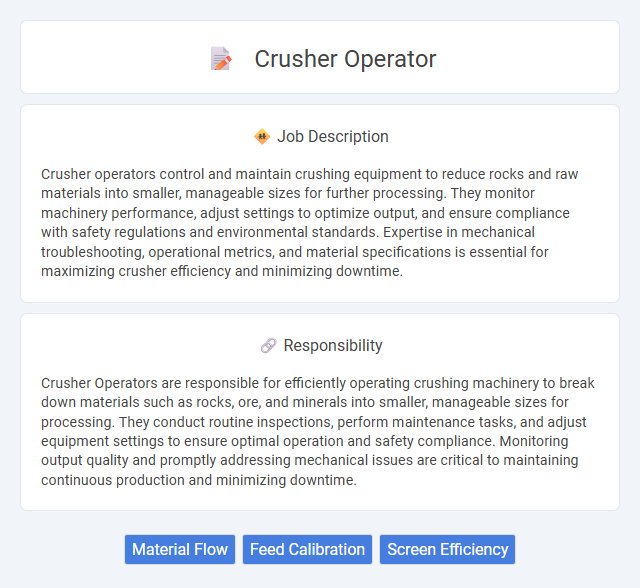
Crusher operators control and maintain crushing equipment to reduce rocks and raw materials into smaller, manageable sizes for further processing. They monitor machinery performance, adjust settings to optimize output, and ensure compliance with safety regulations and environmental standards. Expertise in mechanical troubleshooting, operational metrics, and material specifications is essential for maximizing crusher efficiency and minimizing downtime.
Individuals with strong physical stamina and good hand-eye coordination are more likely to perform well as crusher operators. Those comfortable with loud, dusty environments and able to maintain focus during repetitive tasks may find this role suitable. People prone to respiratory issues or sensitivity to noise might face challenges in this position.
Qualification
Crusher Operators typically require a high school diploma or equivalent, along with specialized training in heavy machinery operation. Certification or licensing in equipment handling and safety protocols is often preferred or mandated by employers. Practical experience with crushers and knowledge of mechanical maintenance significantly enhance job performance and career prospects.
Responsibility
Crusher Operators are responsible for efficiently operating crushing machinery to break down materials such as rocks, ore, and minerals into smaller, manageable sizes for processing. They conduct routine inspections, perform maintenance tasks, and adjust equipment settings to ensure optimal operation and safety compliance. Monitoring output quality and promptly addressing mechanical issues are critical to maintaining continuous production and minimizing downtime.
Benefit
Working as a Crusher Operator likely offers competitive wages due to the technical skills required and the demand in construction and mining industries. There is probability of receiving benefits such as health insurance, paid time off, and retirement plans depending on the employer. Job stability may also be a potential advantage given ongoing infrastructure development projects and resource extraction activities.
Challenge
Working as a crusher operator likely involves managing complex machinery under physically demanding conditions, presenting constant challenges in maintaining optimal performance. The role may require troubleshooting mechanical issues quickly to minimize downtime, making problem-solving skills crucial. Adapting to varying material types and ensuring safety protocols are followed also probably adds to the operational difficulties faced daily.
Career Advancement
Crusher operators play a crucial role in the mining and construction industries by managing equipment that crushes rock and other materials into smaller, manageable sizes. Mastery of machinery operation and safety protocols can lead to promotions such as heavy equipment operator or site supervisor positions, offering increased responsibilities and higher wages. Continuous skill development and certifications in equipment maintenance and safety standards significantly enhance career advancement opportunities within this sector.
Key Terms
Material Flow
Crusher Operators manage the efficient flow of raw materials through crushing equipment, ensuring continuous and optimized processing rates. They monitor feed rates, adjust machine settings, and inspect output sizes to maintain consistent material quality and prevent bottlenecks. Maintaining proper material flow reduces downtime and maximizes production efficiency in mining or construction operations.
Feed Calibration
Crusher Operators specialize in precise feed calibration to ensure optimal crusher performance and product consistency. Accurate feed regulation minimizes equipment wear and maximizes throughput, directly impacting operational efficiency. Mastery in feed calibration involves adjusting feed rates based on material type and crusher specifications to maintain optimal crushing conditions.
Screen Efficiency
Crusher Operators play a critical role in maintaining screen efficiency by monitoring and adjusting equipment settings to ensure optimal material flow and particle size distribution. They regularly inspect screens for wear, blockages, and alignment issues, performing timely maintenance to prevent downtime and maximize throughput. Effective screen efficiency directly impacts the overall productivity and quality of the crushing process, making the operator's expertise essential in achieving consistent output standards.
 kuljobs.com
kuljobs.com